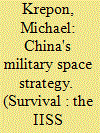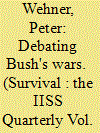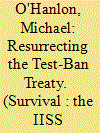|
|
|
Sort Order |
|
|
|
Items / Page
|
|
|
|
|
|
|
| Srl | Item |
| 1 |
ID:
081729


|
|
|
| 2 |
ID:
081724


|
|
|
| 3 |
ID:
081727


|
|
|
|
|
| Publication |
2008.
|
| Summary/Abstract |
Even with some tactical gains from the surge, there are few remaining alternatives to a galloping civil war in Iraq and regional destabilisation. Insurgencies, like most wars, end in political settlements; indeed most insurgencies have been ended by political settlements. The ability to shape or cajole such settlements out of military victory has never been a strength of the United States' political-military diplomacy. A UN-led effort with an excellent leader and negotiator and the support of key regional and world players will require something close to a revolutionary change in the current outlook; first by the United States and the Iraqi leadership, but also by the UN and the regional and world players
|
|
|
|
|
|
|
|
|
|
|
|
|
|
|
|
| 4 |
ID:
081725


|
|
|
|
|
| Publication |
2008.
|
| Summary/Abstract |
Between the poles of nuclear-weapons acquisition and transparent disarmament lies a third option: cultivating ambiguity about capabilities. The current crises with Iran and North Korea are playing out against the backdrop of the contrasting nonproliferation precedents set in 2003 - in Iraq, through a change of regime, and, in Libya, through change within a regime. Washington has sent mixed messages to Tehran and Pyongyang whether the US objective is regime change or behaviour change. Coercive diplomacy, combining credible inducements and penalties to roll back their nuclear programmes, is not possible when the goal is the maximalist one of regime change. But even if the United States clarifies its objective, negotiations with North Korea and Iran can realistically aim only to narrow, but not to eliminate, the ambiguity. A strategy of containment, whose key elements are deterrence and reassurance, offers the best approach for narrowing and hedging against these states' nuclear ambiguity
|
|
|
|
|
|
|
|
|
|
|
|
|
|
|
|
| 5 |
ID:
081721


|
|
|
|
|
| Publication |
2008.
|
| Summary/Abstract |
Since 1991, thinking about defence has been based on a fantastical theory about the character of future war rather than a clear vision of emerging threats to national and international security. A thorough study of contemporary conflict in historical perspective is needed to correct flawed thinking about the character of conflict, help define future challenges to international security, and build military and civilian governmental capabilities to meet those challenges. Recent and ongoing conflicts in Afghanistan, Iraq and southern Lebanon reveal that military campaigns must be subordinate to a larger strategy that integrates political, military, diplomatic, economic and strategic communication efforts. Military forces must abandon the illusion that technology can solve the problem of future conflict. Leaders should also abandon the belief that wars can be waged efficiently with a minimalist approach to the commitment of forces and other resources
|
|
|
|
|
|
|
|
|
|
|
|
|
|
|
|
| 6 |
ID:
081723


|
|
|
|
|
| Publication |
2008.
|
| Summary/Abstract |
The United States is well placed to remain the leading power in the twenty-first century, but it will have to learn to work with other countries to share the leadership role. Washington should adopt a strategy of providing global public goods analogous to the role the United Kingdom played in the nineteenth century, and it will need to combine its 'soft-power' and 'hard-power' resources into a 'smart-power' strategy. The paradox of American power in this century is that the largest power since the Roman Empire cannot achieve its objectives by acting alone
|
|
|
|
|
|
|
|
|
|
|
|
|
|
|
|
| 7 |
ID:
081726


|
|
|
|
|
| Publication |
2008.
|
| Summary/Abstract |
The comprehensive test-ban treaty makes very good strategic sense for the United States and the world. The next American president should build on Bill Clinton's signing of that treaty, as well as George W. Bush's tacit compliance with its strictures, and send it to the US Senate for ratification. It makes sense whether Iran tests its own nuclear weapon in the coming years or not; either way, Washington will need more capacity to apply more pressure on states like Iran, and the treaty could help it garner international support for such pressure. American ratification of the treaty might also be part of a deal by which India and Pakistan agree not to do more testing themselves, joining the United States in a pledge of future restraint.
|
|
|
|
|
|
|
|
|
|
|
|
|
|
|
|
| 8 |
ID:
081722


|
|
|
|
|
| Publication |
2008.
|
| Summary/Abstract |
Strategic theory has failed to provide the tools with which to examine the conflicts now being waged. Major war is the preferred vehicle for the development of strategy, as the issues are absolute, the role of contingency diminished and the play of policy less overt. But a phenomenon increasingly remote from the actual experience of war does not provide a sufficient template for the current debate on strategy. The result is a discussion in flux, without unifying themes or coherence. The labels we currently attach to lesser wars, such as low-intensity operations, irregular war or counter-insurgency warfare, define themselves by their means, not their ends. Governments talk about major war but provide the means only for small war. Having set out with political goals that were unrealisable, they have not adjusted those goals but focused on military solutions which lack a political end. So the application of military capabilities becomes, by default, an end in itself
|
|
|
|
|
|
|
|
|
|
|
|
|
|
|
|
| 9 |
ID:
081728


|
|
|
|
|
| Publication |
2008.
|
| Summary/Abstract |
The Saudi Arabian regime, aided by oil money and custodianship of Islam's holiest sites, has in recent years emerged as one of the most active and creative diplomatic players in the Middle East. Yet the regime's imaginative interventions in foreign affairs contrast starkly with its immobility in the face of deepening divisions at home. To minimise the perceived threat from Shites in Iran, Iraq and Lebanon, the most sensible course is not to pursue a tacit anti-Shia alliance with the United States and Israel, but rather to improve social and political conditions for Shtes at home. This would require confronting the Wahhabi clerical establishment head on, which could fatally undermine one of the pillars of al-Saud rule. The regime appears fated to opt for continued immobility, engaging in largely symbolic regional diplomacy in the hope that this will some how buy it credit at home
|
|
|
|
|
|
|
|
|
|
|
|
|
|
|
|
|
|
|
|
|